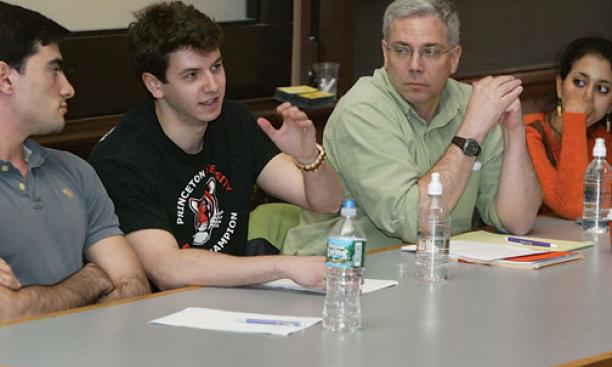

Students who violate the ban on freshman Greek life should be suspended, according to a University committee created to recommend enforcement strategies and penalties that would promote “full compliance” with the policy.
Kathleen Deignan, dean of undergraduate students and the head of the Freshmen Rush Policy Implementation Committee, outlined a two-pronged policy at a March 26 meeting: Freshmen may not affiliate with Greek organizations, and older students may not solicit freshman members.
President Tilghman will consider the committee’s suggestions and was expected to make a decision by the end of the spring term. The ban on freshman affiliation with fraternities and sororities, announced last August, takes effect with the incoming freshman class.
According to the committee’s recommendations, any freshman who joins, pledges, or rushes a Greek organization should face a penalty of suspension, as should any Greek member who offers membership to or organizes Greek-sponsored events for freshmen. A freshman who takes part in any other Greek-sponsored activity may be subject to disciplinary probation.
The committee said that even if a group has dropped its Greek letters or national affiliation, it still should be considered a fraternity or sorority if it has a primarily social purpose and an exclusive membership. The eating clubs and recognized student organizations would be exempt from the policy.
More than 50 students attended an April 2 forum sponsored by the committee, seeking clarification of what they saw as ambiguities in the proposed policy and challenging provisions that they saw as unfair.
Some said the policy would go too far in banning freshmen from attending any Greek-sponsored events, including those not specifically geared toward recruitment. Sigma Alpha Epsilon member Brian Kusiak ’12, in a reference to the fact that freshmen could not be invited to Greek semiformal or formal events, said after the forum that the policy could be summarized as “Princeton bans dating freshmen.”
The committee said in its report that it had deliberated whether the policy should cover events like formal dances and charitable events, but said it was essential to provide an “unambiguous” line between permitted and prohibited activities.
Others students at the forum expressed concern that the penalty of suspension was as severe as that for students found to have possessed drugs.
“Holding students to a higher standard for socializing in a way that the University dislikes should not be viewed more harshly than underage drinking or drug possession, both of which are illegal offenses,” former Kappa Alpha Theta president Kara Dreher ’12 said after the session.
Other students questioned the policy’s definition of exclusive social groups. Andreas Rotenberg ’13 asked if a University-recognized a cappella group could be created that would recruit only fraternity members. Deignan said yes, as long as the group made clear that it was choosing its members “on the basis of talent.”
Members of the implementation committee stressed that the policy was not intended to hinder casual conversation between freshmen and members of Greek organizations. “I don’t feel that my ability to interact with freshmen, in a friendship context, is inhibited in any way,” said Shreya Murthy ’13, a member of the Pi Beta Phi sorority who served on the committee.
Deignan also said that the policy does not forbid Greek members from encouraging freshmen to rush their organizations during sophomore year.
Another point of contention was the decision to ban affiliation activities for all of freshman year.
“I think the policy is clear, well-worded, and fair in an important sense, but I think it’s worse than the alternative of spring rush,” said committee member Jake Nebel ’13, a former president of Alpha Epsilon Pi.
Nebel pointed to Yale University’s recently announced ban on freshman rush, which will apply only to the fall semester. “Yale students obviously do not mature at a faster rate,” he said.
The implementation committee said in its report that it regarded University policy, “which is to discourage all students from joining sororities and fraternities at any time during their college careers,” as an “institutional value judgment” that was not open to question.
The committee said that a penalty of suspension would be the best way to achieve the charge set out by Tilghman of full compliance with the policy. It cited the successful effort to end the “Nude Olympics” a decade ago with the deterrent of suspension.
The report also raised the possibility of tougher sanctions against the Greek organizations if students seek to undercut the freshman ban. Recounting Tilghman’s presence at a committee meeting in December, the report said that “she suggested that in the future, violations of the prohibition on freshman affiliation can be expected to further reduce the University’s tolerance of sophomore, junior, and senior affiliation.”
